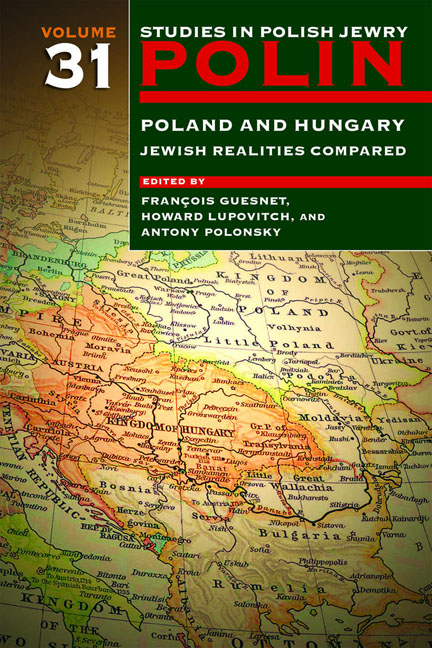Book contents
- Frontmatter
- Dedication
- Editors and Advisers
- Preface
- Polin
- Polin: Studies in Polish Jewry
- Contents
- Note on Place Names
- Note on Transliteration
- Part I POLAND AND HUNGARY: JEWISH REALITIES COMPARED
- JEWISH ACCULTURATION AND INTEGRATION
- JEWISH RELIGIOUS LIFE
- JEWS IN POPULAR CULTURE
- THE INTERWAR YEARS
- THE HOLOCAUST AND ITS AFTERMATH
- PERSONAL REFLECTIONS
- Part II NEW VIEWS
- Part III OBITUARIES
- Notes on the Contributors
- Index
‘Anti-Fascist Literature’ As Holocaust Literature? the Holocaust in the Hungarian Socialist Literary Marketplace, 1956–1970
- Frontmatter
- Dedication
- Editors and Advisers
- Preface
- Polin
- Polin: Studies in Polish Jewry
- Contents
- Note on Place Names
- Note on Transliteration
- Part I POLAND AND HUNGARY: JEWISH REALITIES COMPARED
- JEWISH ACCULTURATION AND INTEGRATION
- JEWISH RELIGIOUS LIFE
- JEWS IN POPULAR CULTURE
- THE INTERWAR YEARS
- THE HOLOCAUST AND ITS AFTERMATH
- PERSONAL REFLECTIONS
- Part II NEW VIEWS
- Part III OBITUARIES
- Notes on the Contributors
- Index
Summary
THE long-accepted, fairly universal idea of a ‘great silence’ on the Holocaust in general, and in Hungary in particular, extending from the end of the Second World War until the Eichmann trial, has recently been challenged. The return or emergence from hiding of survivors quickly led to an explosion of Holocaust literature. Before the communist takeover, in the midst of difficult material and turbulent political conditions, JenőLévai and others published collections of documents; memoirs and fiction by Béla Zsolt were serialized in the weekly Haladás and other journals; Viktor Karády estimated the number of Holocaust-related publications at around 300 per year between 1945 and 1947.
The conventional timeline for Hungarian Holocaust memory runs from the flurry of literary production and public discussion before 1948, to the fastening of an ideological straitjacket, only picking up again after the mid-1970s, when landmark works such as Mária Ember's Hairpin Turn, György Moldova's Saint Imre March, and later Nobel Prize winner Imre Kertész's Fatelessness, among others, appeared, leading to a gradually expanding discussion through the era of later socialism. In the words of the doyen of historians of the Hungarian Holocaust, Randolph L. Braham, after taking power, the communist government ‘soon began an assault on the memory of the Holocaust… . The Holocaust, like the “Jewish Question” in general, were for many decades sunk in an Orwellian black hole of history.’ Others speak of a ‘knot of silence’, a ‘ban on Jewish memory’, or the ‘years of silence’. Gábor Gyáni also refers to ‘the deep silence’, ‘the partial or total lack of keeping in mind the memory of Jewish suffering and mass death, the Holocaust in its entirety [which] lasted until the 1960s and, in several areas, well into the 1970s’.
There were certainly limits to the range and style of expression and distortions forced by ideological structures and various, changing, taboos. The significance of Kertész with his groundbreaking, non-ideological approach, and the breakthroughs of the 1970s, should not be underestimated: they were both harbingers of a new sensibility, corresponding to new awareness of Jewish identity. However, the absence of Holocaust literature in the previous period, especially after 1956, is exaggerated. The standard timeline of Holocaust memory in socialist Hungary suffers from a tendency to look back with a very contemporary sensibility, tinged with the insights of Kertész and other treatments from Hungary and abroad.
- Type
- Chapter
- Information
- Polin: Studies in Polish Jewry Volume 31Poland and Hungary: Jewish Realities Compared, pp. 409 - 426Publisher: Liverpool University PressPrint publication year: 2018



